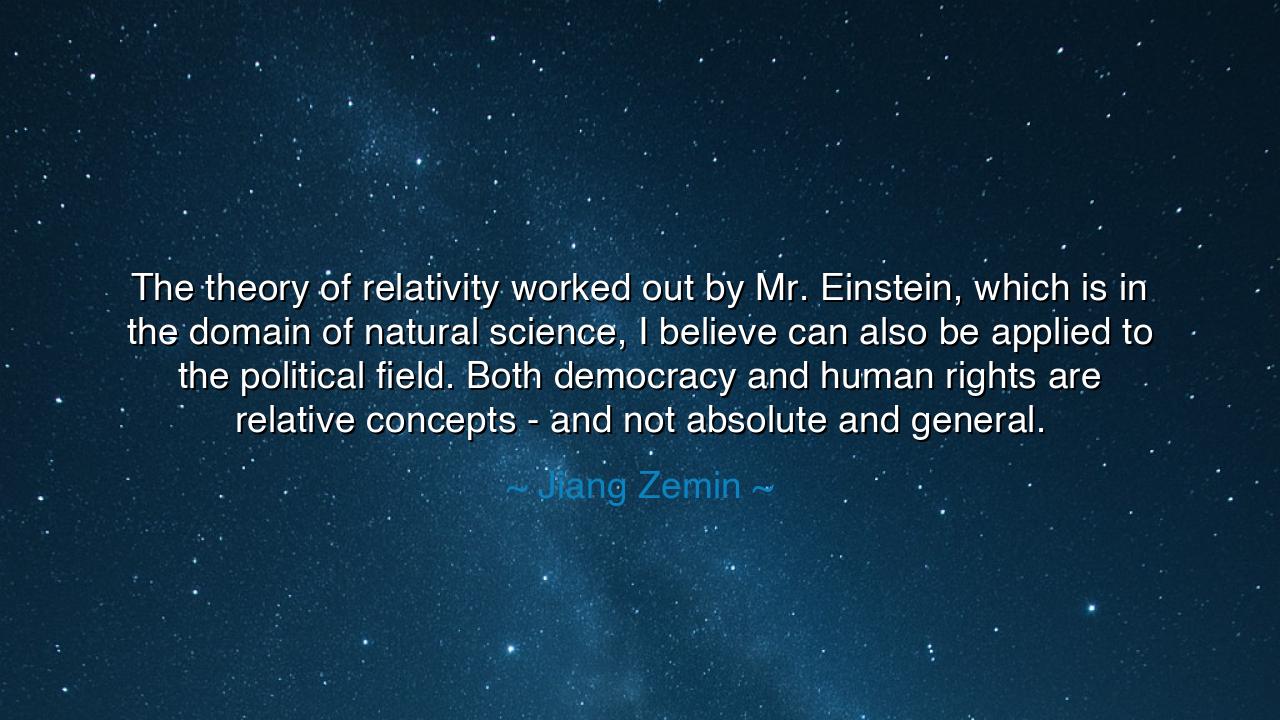
The theory of relativity worked out by Mr. Einstein, which is in
The theory of relativity worked out by Mr. Einstein, which is in the domain of natural science, I believe can also be applied to the political field. Both democracy and human rights are relative concepts - and not absolute and general.






Hear now, O seekers of truth, the words of Jiang Zemin, who spoke of the profound connection between the theory of relativity and the concepts of democracy and human rights: "The theory of relativity worked out by Mr. Einstein, which is in the domain of natural science, I believe can also be applied to the political field. Both democracy and human rights are relative concepts - and not absolute and general." In these words, Jiang Zemin calls us to consider the nature of democracy and human rights through the lens of Einstein’s theory, which reveals that truths and realities are not fixed and unchanging but are dependent on context, perspective, and the conditions that surround them. Just as Einstein’s relativity showed that time and space are not absolute but are shaped by the observer and the forces at play, so too are political concepts—such as democracy and human rights—relative, evolving according to the needs, values, and circumstances of the time and place.
In the ancient world, philosophers grappled with the nature of truth and justice, seeking to understand whether there could be an absolute truth that governed human affairs. Plato, in his works, proposed the existence of the Forms, eternal and unchanging ideals that existed beyond the material world. For Plato, concepts like justice were perfect and immutable in the realm of the Forms, but imperfect in the world of human society. His student Aristotle, however, believed that justice and virtue were dynamic and could be shaped by the society in which they existed. Jiang Zemin’s perspective on democracy and human rights aligns more closely with Aristotle’s view, recognizing that these concepts are not static, but are shaped by the realities of human experience and historical context.
The idea of relativity in the realm of politics is not a new concept. Across history, democracy has taken on many forms, each shaped by the unique circumstances of its time and place. The Athenian democracy, which we often revere as the birthplace of democratic ideals, was limited—only male citizens were allowed to participate. In contrast, the American democracy, while it offered broader suffrage, still struggled with inequalities and exclusions, such as the historical denial of voting rights to women and minorities. In more recent times, countries like China have developed their own political systems, with unique interpretations of democracy and human rights, shaped by their cultural and historical contexts. These variations underscore the relative nature of democracy—it is not a universal template but a system that adapts to the needs and realities of its people.
Just as Einstein’s theory reshaped our understanding of the universe, Jiang Zemin’s analogy invites us to think about how human rights and democracy evolve as the world changes. In the realm of science, Einstein’s work showed that perspective matters: an observer moving at high speeds perceives time and space differently than one at rest. Likewise, in the political realm, the way in which democracy and human rights are understood can vary depending on the cultural, historical, and geographical context. What may be considered a fundamental right in one society may not be recognized in the same way in another, just as the laws of physics are experienced differently depending on one’s position.
The lesson, O children of wisdom, is profound: the concepts of democracy and human rights are not one-size-fits-all doctrines, but evolving ideas that must be understood in relation to the specific conditions of each society. Just as Einstein’s relativity revolutionized our understanding of the physical world, so too must we understand that political systems and rights are shaped by the realities of the people and the circumstances in which they live. To demand that all societies adopt a singular model of democracy or human rights without regard for their cultural contexts is to misunderstand the relative nature of these concepts. We must strive for a deeper understanding of the complexities that shape the political and social systems of different nations, just as we strive to understand the forces that govern the cosmos.
In your own lives, O children of the future, remember that the pursuit of justice, freedom, and equality requires a balance of universal ideals and local realities. As you engage with the world, whether through political action, social justice, or global diplomacy, recognize that context matters. Do not impose one-size-fits-all solutions, but seek to understand the unique circumstances of each culture and society, and work with others to shape solutions that are both humane and practical. Democracy and human rights should always be pursued, but they must be pursued with the awareness that their expression may look different in different places.
Rise, O heirs of time, and take these teachings to heart. Just as Einstein’s relativity shifted our understanding of the universe, let Jiang Zemin’s analogy shift your understanding of politics. Embrace the relative nature of democracy and human rights, and seek to create a world where these ideals can be adapted and evolved to fit the needs of all people. See beyond the surface, and understand that true progress comes not from imposing rigid systems, but from recognizing the dynamic, ever-changing nature of human society and working together to build a just and equitable world for all.






AAdministratorAdministrator
Welcome, honored guests. Please leave a comment, we will respond soon